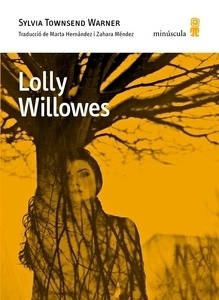Lolly Willowes

Editorial Minúscula
Colección Microclimes, Número 12
Lugar de edición
Barcelona, España
Fecha de edición diciembre 2016 · Edición nº 1
Idioma catalán
EAN 9788494534850
220 páginas
Libro
Dimensiones 120 mm x 170 mm
Resumen del libro
Lolly Willowes (1926) narra la lluita d'una dona per trencar amb el control de la família. És una història que comença de manera clàssica, com una saga familiar magníficament escrita i que de cop es converteix en un relat desenfrenat, amb una dimensió sobrenatural, però ple de lucidesa. L'alegria de viure, l'autonomia de les dones i la passió s'aborden en aquesta originalíssima novel la que aprofundeix amb intel ligència en la condició de la dona. Sylvia Townsend Warner, amb un geni subversiu que sx{0026} 39;anticipa als mons fantàstics d'escriptores més recents, és una de les indispensables rebels de la literatura del segle xx.
Biografía del autor
Sylvia Nora Townsend Warner was born at Harrow on the Hill, Middlesex, the only child of George Townsend Warner and his wife Eleanor "Nora" Mary (née Hudleston). Her father was a house-master at Harrow School and was, for many years, associated with the prestigious Harrow History Prize which was renamed the Townsend Warner History Prize following his death in 1916. As a child, Townsend Warner was home-schooled by her father after being kicked out of kindergarten for mimicking the teachers. She was musically inclined, and, before World War I, planned to study in Vienna under Schoenberg. She enjoyed a seemingly idyllic childhood in rural Devonshire, but was strongly affected by her father's death. She moved to London and worked in a munitions factory at the outbreak of World War I.<br><br>In 1923, she met T. F. Powys, whose writing influenced her own and whose work she in turn encouraged.The two became friends, and her debut novel, Lolly Willowes, was published shortly after in 1926. From her first work, it was clear that Warner's focus was on subverting societal norms; she would later heavily use the themes of rejecting the Church, a need for female empowerment, and independence in her works. It was at Powys' home that Warner first met Valentine Ackland, a young poet; the two women fell in love, moving in together in 1930 and eventually settling at Frome Vauchurch, Dorset, in 1937. Her relationship with Ackland inspired much of Warner's works, including a published collaboration of poems, Whether a Dove or a Seagull, in 1933. Alarmed by the growing threat of fascism, they were active in the Communist Party, and Marxist ideals found their way into Warner's works. Warner participated in the II International Congress of Writers for the Defence of Culture, held in Valencia between 4 and 17 July 1937, while serving in the Red Cross during the Spanish Civil War. After the war, Warner and Ackland permanently returned to England, living together until Ackland's death in 1969. After Warner's death in 1978, her ashes were buried with Ackland's at St Nicholas, Chaldon Herring, Dorset.








